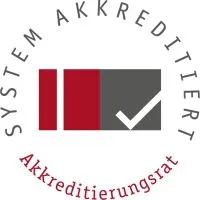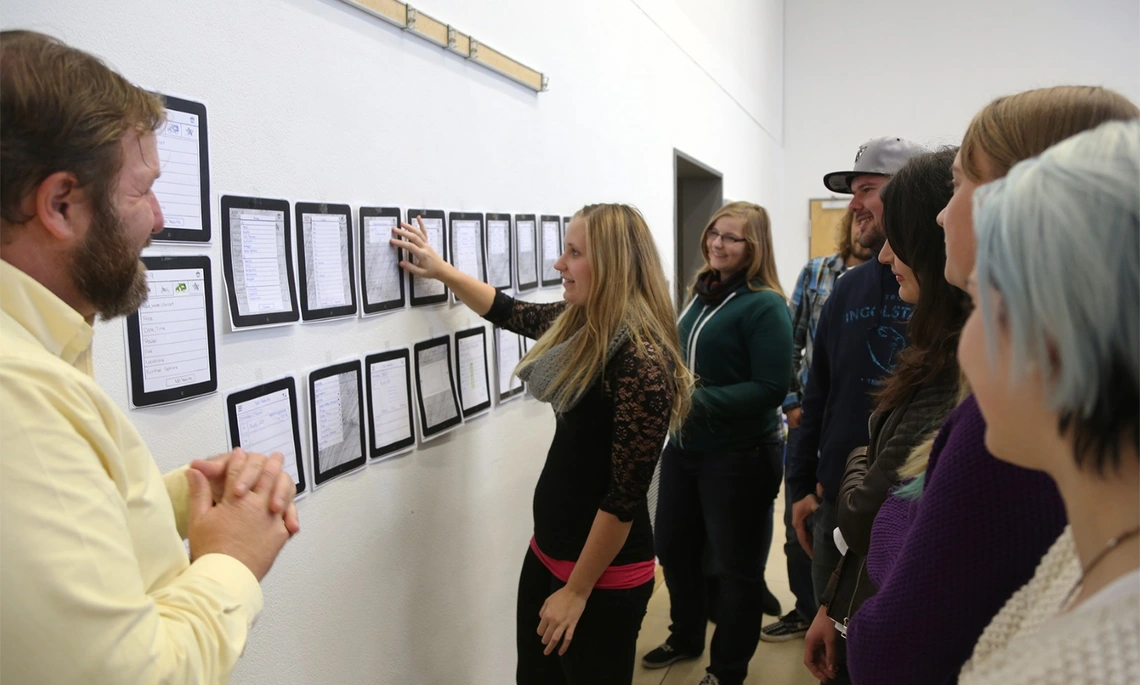Nowadays, the success of a product mainly depends on how well it can be used or handled. Manufacturers attach increasing importance to product design and arousing the right emotions in buyers. The degree course in UXD provides precisely this much sought-after qualification. The aim is to make the man-machine interface as effective as possible for a particular user by means of user centred design. The focus is on the user experience with the product in terms of technology (programming), design and conception (usability).
User Experience Design (B. Sc.)
Bachelor of Science (B. Sc.)
7 Semesters
Winter
Yes
Yes
German
Contents
The “User Experience Design” course at THI, with a standard duration of 7 semesters, was developed to meet the constantly changing requirements of product development, usability and marketing - especially with regard to aspects such as values, emotions or cultural differences.
In accordance with ISO standard 9241-210, the term “user experience” covers all aspects of a user's experience when using a product or interacting with a product, computer program or service.
The job description of a “user experience designer” involves making the use of a product (often software, IT systems, apps or websites) as pleasant and easy as possible through a user-centered approach in order to create a positive experience for the user. While usability reflects the “pragmatic quality” (effective and efficient task completion), UX is concerned with the “hedonic quality”. This goes beyond pure usefulness, for example by making products particularly stimulating or communicating a certain image through their design.
The UX designer is responsible for the visual design, but also for the information architecture and information design. The aim is to design “products” that users/consumers find aesthetic and attractive and that are a pleasure to use.
A UX designer is the link between product development, IT, implementation, visual design and sound design, ergonomics, marketing/branding, trends, etc.
The course imparts interdisciplinary knowledge from the fields of computer science, design, usability, psychology, business fundamentals and entrepreneurship.
The course is nationally oriented. Courses are predominantly held in German. Individual courses may be offered in English.
1. Semester
Einführungsprojekt
Softwarentwicklung 1
Mathematik
Gestaltung 1
Typografie und Skizzieren
Englisch
2. Semester
Grundlagen der Informaik
Softwareentwicklung 2
Statistik
Gestaltung 2
Informationspsychologie
3. Semester
Webtechnologien
Software Engineering
Design von Mensch-Maschine-Schnittstellen
Technik der Mensch-Maschine-Interaktion
Grundlagen der Betriebswirtschaft und des Gründertums
4. Semester
Webdesign und Webusability
Produktdesign
Computergrafik / 3-D-Design
Prinzipien der Mensch-Maschine-Interaktion
Projektmanagement
5. Semester
Vorbereitendes Praxisseminar PLV 1
Praktikum
Nachbereitendes Praxisseminar PLV 2
Informations- und Medienkompetenz PLV 3
6. Semester
7. Semester
Electives
Seminar Bachelor's Thesis
Bachelor's Thesis
Quick Info
- Applying for a degree course
Students may only begin their degree in the winter semester. - Registration dates
Applications for this degree may be submitted through the online application system from 2 May to 15 July, 2025. - Admission requirements
Please find all information on admission and application on our Bachelor application pages Admission requirements for international students
If you wish to study at a German University, you need a so-called Hochschulzugangsberechtigung (HZB), or higher education entrance qualification. This is a secondary school-leaving certificate that corresponds to the German Abitur and entitles you to study.
Students from abroad must apply for admission from the university of their choice. For your application, you will require for a Bachelor's degree:- a school-leaving certificate (also known as "university entrance qualification", e.g. High School Diploma, Matura, A-Levels, Bachillerato, Atestat, baccalauréat)
or - proof that you have passed the university entrance examination (if required in your home country)
(Source: German Academic Exchange Service, DAAD, July 2016)
- a school-leaving certificate (also known as "university entrance qualification", e.g. High School Diploma, Matura, A-Levels, Bachillerato, Atestat, baccalauréat)
The area of user experience design is very exciting and highly dynamic. In order to be successful, a UX designer has to be active in the community and make a name for themselves. We recommend that students should write about their degree assignments and other projects during their degree course, for example in the relevant online media, in a blog or on Twitter: this will enable them to build up a “portfolio” (rather like an application dossier) for later job applications. This of course also includes networking with like-minded individuals at UX events such as BarCamps, local UX meet-ups and LinkedIn groups, as well as commenting on blog posts. The best way to break into this area is by means of interaction, discussion and dialogue.
FAQs
The course offers the opportunity to design products and services creatively and technically to improve people's daily lives. It combines artistic design with technical know-how and psychological understanding to create useful and aesthetically pleasing solutions. The demand for UX experts is high. This opens up career prospects.
No. No prior knowledge of programming or design is required. The course is designed to provide basic knowledge in both areas so that you can develop the necessary skills and knowledge over the course of your studies.
The course is a Bachelor of Science (B.Sc.) with a corresponding focus on technical aspects. You need technical skills in order to be able to implement the design solutions. You will learn these in the course of your studies along with design, psychology, conception, usability and economic principles.
The number of study places is limited. This means that the admission requirements can change from year to year. You can find up-to-date information on the application process on our website.
If you have a passion for creative design, enjoy solving problems, want to improve people's lives and are interested in how people interact with technology, the User Experience Design course is right for you. The course is ideal for designing innovative and user-friendly solutions that provide real added value for people.
The basic concepts of programming and software development are learned using the Java programming language. HTML, CSS and JavaScript are added for web development. In the further course of the degree course, there may be other programming languages depending on the project and focus.
Absolutely. You can spend the practical semester in a foreign company or even study semesters abroad. Our network of more than 160 partner universities worldwide already offers a wide selection. You will be supported by our International Office. The intercultural experience and new professional perspectives are valuable additions to your academic and personal development.
Yes, you can also complete a Master's degree in User Experience Design with us. It follows on seamlessly from the Bachelor's degree and offers ideal conditions for further specialization in the field. The Master's course is taught in English and therefore also offers a good opportunity to come into contact with many international students.
Program director

Prof. Ingrid Stahl
Phone: +49 841 9348-2341
Room: A101
E-Mail: Ingrid.Stahl@thi.de
More contact options

Prof. Dr. Christian Sturm
Phone: +49 841 9348-3794
Room: B004
E-Mail: Christian.Sturm@thi.de



Module Handbook
The module handbook contains information on prerequisites, contents, learning outcomes, ECTS points, duration, work load, literature, references of the offered modules and lectures.
Module handbook Bachelor User Experience Design
Study and Examination Regulations
Study and examination regulations (SPO) deal with judicial matters concerning your study course. Please turn to the pages of the legal department for Statutes of this course.
For any questions on requirements, exams regulations and more, please turn to the Service Center Study Affairs.





![[Translate to English:] Logo Akkreditierungsrat: Systemakkreditiert](/fileadmin/_processed_/2/8/csm_AR-Siegel_Systemakkreditierung_bc4ea3377d.webp)








![[Translate to English:] Logo IHK Ausbildungsbetrieb 2023](/fileadmin/_processed_/6/0/csm_IHK_Ausbildungsbetrieb_digital_2023_6850f47537.webp)


